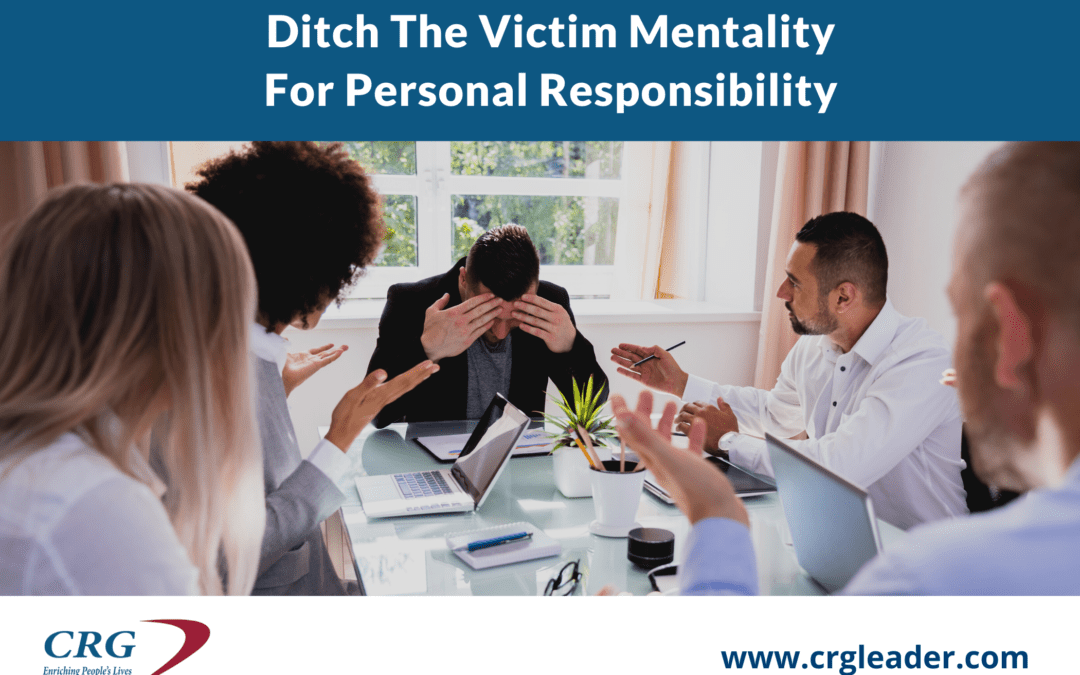Do you know someone who constantly plays the victim card — blaming others and the world for their unfortunate circumstances?
Chances are, at some point in your life, you’ve encountered people who seem to live in a constant state of drama that seems to be never their fault. They immediately complain about their latest ordeal and misfortune when they sit down.
Listening to their seemingly endless tales of woe can be exhausting and frustrating, especially when they are full of negativity and believe that their problems are the fault of everyone else but them.
I should know. I have encountered a lot of these in my long career and yes – I have been guilty of this mindset as well!
Although some may have a legitimate story that supports their situation, does that justify the victim mentality?
Absolutely not!
People with a victim mentality believe that they are helpless and that the whole world is against them. They feel that they are victims whenever something goes wrong, even if the incident doesn’t involve them. They are less likely to be open to new solutions and might instead prefer to be where they are, miserable.
Victim mentality makes people see themselves as victims of other people’s hostile acts. Essentially, it is an act of avoidance – some way of refusing to accept any responsibility for their actions or their lives.
When the victim card plays, the victim tries to shift the onus onto outside influences. That suggests the victim has played no role in creating the situation and has no power to change it.
That attitude plays perfectly into the victim mentality: After all, it’s not the victim’s fault, so they can’t do anything about it.
If you’ve read the book, The Road Less Traveled by author Scott Peck, you will see that Peck identified one of the most complex destructive and most difficult mental conditions to treat is “character disorder”; this is where it is everyone else’s fault. Successful treatment is challenging because the individuals do not take personal responsibility for their contribution to their situation.
And this happens a lot of times in the workplace.
The bottom line is you can see this anywhere. You see these kinds of people in colleagues you hear complaining that they only get the menial tasks while others get juicy and exciting projects. You find them in team leaders who blame the manager for giving the brief late; hence, they couldn’t submit the report on time.
The motto of the victim-mentality mindset? It’s not my fault!
Although most of us are guilty of feeling that way at some level, we don’t make it a way of life.
Here are more examples of situations of victim mentality. Watch who these individuals are blaming for their external conditions.
- My son when he was 11-years old felt he could not get good grades in math because of the teacher’s teaching style. We reframed the situation to show that he is responsible for his marks no matter what. His math grade improved.
- Years ago when I became Chair of a private school – many of the past board members had a victim of circumstances mentality. Previous board members said we could never grow the school, given the condition of the community (blue collar) and that most individuals could not afford private education. After that victim-mentality individuals had left the board, we went on to 60% growth in just the 12 months. I guess all the individuals who could not invest in private education moved out of the area.
- A local poverty-action group said that unless the government and the community put several initiatives in place, individuals could never get out of the cycle of poverty. So far, they have fulfilled their expectations, and their poverty group has grown. Note: This does not suggest new programs are not needed, but this group is implying no one can get out of poverty without new programs.
- A very successful colleague and friend in Chicago tells me that many of his friends still struggle and blame their race for their poor conditions. That did not stop him from reaching his goals and living the life he dreamed of. This of course is not politically correct today so they continue to be in the mindset of victimhood.
- Research has proven that your posture and how you carry yourself reveal whether or not you are an easy target (victim). If you act like a victim, it’s more probable that you will become one — even just walking down the street. This was proven with a martial arts class I attended many years ago.
- When confronted by a teenage mother-to-be who wanted support because she could no longer work, the Minnesota Governor suggested she should have thought about that before getting herself into that condition. He asked why the state should pay for other people’s choices. Again this is not politically correct to speak this way.
I’m sure you can think of more examples where similar victim mindsets were evident.
Nothing positive or productive ever comes out of that attitude.
A victim mentality can be disempowering for the individual or group experiencing it. It is a terrible place because it leads a person to avoid stepping outside of their comfort zone, making difficult decisions, or even doing anything to improve their situation.
As a result, they feel stuck and unable to move forward, paralyzed by fear.
Remember that you are also a product of your environment and the company you keep. So be wary of who you let in your circle.
- Who are you hanging out with? They are influencing your behaviors and mindset.
- Be aware of your primary peer group(s). If you spend most of your time interacting with individuals who like to blame others for their circumstances, guess which path you will be heading down.
- Even if they are family members or long-term friends, don’t play victim to the victim. Take personal responsibility and upgrade your circle of friends and peers.
Responsibility is a mark of a good leader. Great leaders own and address any issues or problems hurled at them. This shows that they get the job done and are committed to excellence because they are willing to admit their mistakes and grow from them. A leader who takes responsibility is reliable and trustworthy.
As Sir Winston Churchill once said, “The price of greatness is taking responsibility.”
Are you taking responsibility for your life and circumstances, or are you playing the role of a victim?
To assist you on your journey of taking personal responsibility — and not playing to the victim mentality — I recommend the following CRG resources. These tools will allow you to take ownership in several areas of your life while building your confidence and saying no to the victim mentality.
Action Steps
Ditch The Victim Mentality And Start Taking Personal Responsibility
- When someone around you is constantly playing the victim card, how does that make you feel?
- Think and make a list of the negative consequences of the victim mindset.
- Is there any part of your life where you are currently playing the victim card? If Yes, list them now.
- What has playing a victim cost you or others around you?
- List what has to change for you to take personal responsibility for your current condition. What attitudes do you have to give up?
- Are there people in your life who frequently play the victim card? How is that affecting you? What can you do to limit, reduce, or eliminate these individuals from your life?
- List the benefits that individuals enjoy when they take personal responsibility for their circumstances.
- These CRG resources will contribute to you taking responsibility for your journey.
The Quest For Purpose Journal™ will give you the roadmap for assisting individuals in living a life full of meaning, significance, and purpose.
I ALSO RECOMMEND…
(Click below to take the assessment)

Personal Style Indicator (PSI)
To identify your natural preferences and strengths.

Self-Worth Inventory
To understand how your level of self-worth is affecting your success.

Stress Indicator and Health Planner
To determine how your lifestyle influences your stress and wellness levels.

Values Preference Indicator
To clarify your core values.
9. Victims believe they must wait for others to improve their circumstances, which might never happen. Alternatively, taking personal responsibility can happen this very instant, providing you the opportunity to improve and move forward.
Until next time, keep Living On Purpose!

